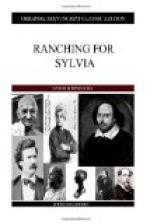She was pleased with his eagerness, but she checked him.
“Then, as you have a gift of making friends, you must take the consequences.”
“I didn’t know I had the gift. My real friends aren’t plentiful.”
“If you begin to count, you may find them more numerous than you think.”
“Those I have made in Canada head the list.”
The girl felt a thrill of satisfaction. This was not a compliment; he had spoken from his heart.
“After all, I don’t see why you should insist on thanking me as well as my father, who really sent you the seed.” She paused. “You didn’t do so on the last occasion; I mean at the time when it was promised to you.”
This was correct, and George was conscious of some embarrassment.
“Well,” he said firmly, “I think I’m justified.”
Flora could not contradict him, and she was glad he felt as he did. She liked his way of sticking to the point; indeed, she was sensible of a strong liking for the man.
During the next minute or two her father came in. He cut short George’s thanks, and then took out his pipe.
“I was in at the Butte yesterday,” he said. “The police have got the men who knocked Farren out, and Flett says they mean to press for a smart penalty. It’s about time they made an example of somebody. When I was in, I fixed it up to turn Langside off his holding.”
Flora looked up with interest.
“But how had you the power?” George asked.
“The man owes me four hundred dollars for a horse and some second-hand implements I let him have nearly three years ago.”
“But he has broken a big strip of his land; it’s worth a good deal more than you lent him.”
“Just so. He owes everybody money round the Butte. I saw Taunton of the store and the implement man and told them Langside had to quit.”
“You seem to have found them willing to agree.”
Grant broke into a grim smile.
“What I say to those men goes. Then I’ve got security; they know I could pull Langside down.”
George looked at Flora and was slightly surprised at her acquiescent manner.
“It sounds a little harsh; a good harvest might have set him straight,” he said. “However, I suppose you have a reason for what you’re doing.”
“That’s so. Langside’s the kind of man I’ve no use for; he takes no interest in his place. After he has put in half a crop, he goes off and spends his time doing a little railroad work and slouching round the saloons along the line.”
“It doesn’t seem sufficient to justify your ruining him.”
“I’ve got a little more against the man. Has it struck you that somebody round here, who knows the trails and the farmers’ movements, is standing in with the liquor boys.”
A light broke in upon George. Now that the matter had been put before him, he could recollect a number of points that seemed to prove the fanner right. When cattle had been killed, their owners had been absent; horses had disappeared at a time which prevented the discovery of their loss from being promptly made. It looked as if the offenses could only have been committed with the connivance of somebody in the neighborhood who had supplied their perpetrators with information.




